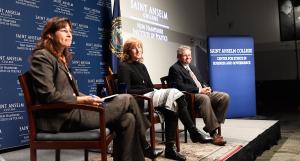
Recognizing over three dozen faculty and staff whose research work was published in 2017, the fourth annual Celebration of Research & Scholarship featured three faculty members who published in Computer Science, Criminal Justice, and Mathematics, respectively.
Mark Cronin, dean of the college, opened the presentations on February 23 in Geisel Library by noting, “Scholarship is often a solitary activity, late at night and early in the morning. It is important to share with the wider community and learn the work of our colleagues.”
Mihaela Malita, associate professor of computer science (pictured), described her research into computational intelligence, which she said is a newer name for artificial intelligence. Malita’s presentation was titled, “Map Redundancies from Elementary Circuits to Cloud – Studies in Computational Intelligence.” Her work was published as a chapter in Uncertainty Modeling: Dedicated to Boris Kovalerchuk on His Anniversary.
Per Professor Malita, Map calculates “big sets of numbers.” By using distributive computing – “many computers to perform many computations in parallel” – complex analysis can be significantly more ambitious and quick, as opposed to one-by-one sequential computation. Malita noted this form of analysis is especially useful for robots and cryptocurrency.
Second to present was Liana Pennington, assistant professor of criminal justice. A former public defender in the New Hampshire legal system, Pennington published, “An Empirical Study of One Participatory Program Facilitated by a Public Defender Office” in the Ohio State Journal of Criminal Law.
The research was explained as evaluating how defense programs work. An approach known as “participatory defense” brings defendants and family members more fully into the court process, engaging and informing the parties. She notes there is a perceived unfairness in the court system from the perspective of defendants.
“Participatory defense is a grassroots movement intended to impact the outcome of cases and change the balance of power in a court,” says Pennington, who has also practiced as a licensed attorney.
Alexander Plyukhin, associate professor of mathematics (calculus), described his proposition that Saint Anselm College students should have more opportunities for involvement in serious research projects.
“These days, a research experience is not just a desirable asset, as it used to be, but in fact is a necessary condition for admission to any competitive graduate program," he says. "Students from many foreign countries, where undergraduate research is a norm rather than an exception, apply to American graduate schools having already published a few papers in their records. This gives the applicants a very strong advantage, compared to domestic students with excellent grades but with no published works.”
Professor Plyukhin proposes Saint Anselm students working on a research project be given the status of a selective course with credit. At the end of the course, a student would write a thesis and present it, in written and oral forms, to a professional committee.
Plyukhin explains, “Graduate schools are more about research than about studying from textbooks, so serious research projects at Saint Anselm would help prepare future graduate school students.”
He acknowledges serious research requires significant time commitment: “The major difficulty here is that working on a research project is very time-consuming, and a student simply has no time for that. Such a research course is of course not for everybody, but would be very beneficial for students who are planning for an academic career.”
Plyukhin recently published a study in statistical mechanics, “Random Walks on Uniform and Non-uniform Combs and Brushes,” referring to types of mathematical graphs.
